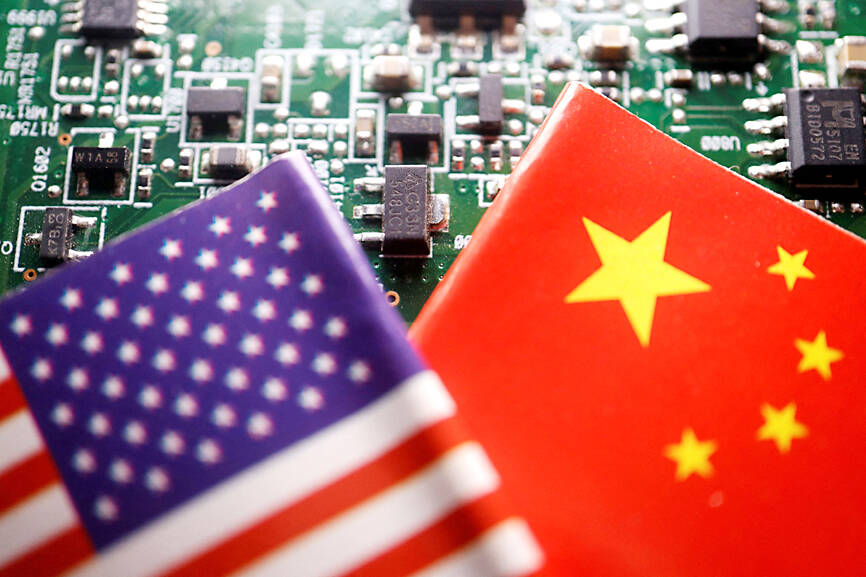US President Joe Biden’s administration is weighing additional curbs on sales of semiconductor equipment and artificial intelligence (AI) memory chips to China that would escalate the US crackdown on Beijing’s tech ambitions, but stop short of some stricter measures previously considered, said sources familiar with the matter.
The restrictions could be unveiled as soon as next week, said the sources, who emphasized that the timing and contours of the rules have changed several times, and that nothing is final until they are published.
The measures follow months of deliberations by US officials, negotiations with allies in Japan and the Netherlands, and intense lobbying by US chip equipment manufacturers who have warned that tougher measures would bring catastrophic harm to their business.

Photo: REUTERS
The latest proposal has key differences from earlier drafts, the sources said. The first is which Chinese companies the US would add to a trade restriction list. The US had previously considered sanctioning six suppliers to Huawei Technologies Co (華為), and officials are aware of at least a half dozen more, the sources said.
They now plan to add only some of those Huawei suppliers to the entity list, with the notable omission of ChangXin Memory Technologies Inc (長鑫存儲), which is trying to develop AI memory chip technology.
The rules now under consideration would also sanction two chip factories owned by Semiconductor Manufacturing International Corp (SMIC, 中芯), Huawei’s chipmaking partner, the sources said.
More than 100 additional entity listings would focus on Chinese companies that make semiconductor manufacturing equipment, the sources said, rather than fabrication facilities that make the chips themselves.
That is a partial win for US chip gear manufacturers — Lam Research Corp, Applied Materials Inc and KLA Corp — that have argued for months against unilateral US restrictions on key Chinese companies, including the six Huawei suppliers.
They have said that such sanctions would put them at an unfair disadvantage compared with foreign rivals Tokyo Electron Ltd and Dutch equipment giant ASML Holding NV, whose governments have not yet agreed to the toughest restrictions on sales to China.
Japan and the Netherlands imposed some China curbs to partially match US measures from 2022, but both countries have resisted recent US pressure for even tighter controls.
The new US rules, which also restrict some additional tool categories, would still exempt allies, including Japan and the Netherlands, from the so-called foreign direct product rule — which allows Washington to control sales of products made anywhere in the world, provided they use even the smallest amount of US technology, sources familiar with the matter said.
It is unclear whether Japan or the Netherlands would eventually impose additional restrictions on the Chinese companies that the US now plans to sanction.
The latest version of the US controls would include some provisions around high-bandwidth memory chips, which handle data storage and are essential to AI. Samsung Electronics Co and SK Hynix Inc along with US memory manufacturer Micron Technology Inc are expected to be affected by the new measures, the sources said.

‘SWASTICAR’: Tesla CEO Elon Musk’s close association with Donald Trump has prompted opponents to brand him a ‘Nazi’ and resulted in a dramatic drop in sales Demonstrators descended on Tesla Inc dealerships across the US, and in Europe and Canada on Saturday to protest company chief Elon Musk, who has amassed extraordinary power as a top adviser to US President Donald Trump. Waving signs with messages such as “Musk is stealing our money” and “Reclaim our country,” the protests largely took place peacefully following fiery episodes of vandalism on Tesla vehicles, dealerships and other facilities in recent weeks that US officials have denounced as terrorism. Hundreds rallied on Saturday outside the Tesla dealership in Manhattan. Some blasted Musk, the world’s richest man, while others demanded the shuttering of his

ADVERSARIES: The new list includes 11 entities in China and one in Taiwan, which is a local branch of Chinese cloud computing firm Inspur Group The US added dozens of entities to a trade blacklist on Tuesday, the US Department of Commerce said, in part to disrupt Beijing’s artificial intelligence (AI) and advanced computing capabilities. The action affects 80 entities from countries including China, the United Arab Emirates and Iran, with the commerce department citing their “activities contrary to US national security and foreign policy.” Those added to the “entity list” are restricted from obtaining US items and technologies without government authorization. “We will not allow adversaries to exploit American technology to bolster their own militaries and threaten American lives,” US Secretary of Commerce Howard Lutnick said. The entities

Minister of Finance Chuang Tsui-yun (莊翠雲) yesterday told lawmakers that she “would not speculate,” but a “response plan” has been prepared in case Taiwan is targeted by US President Donald Trump’s reciprocal tariffs, which are to be announced on Wednesday next week. The Trump administration, including US Secretary of the Treasury Scott Bessent, has said that much of the proposed reciprocal tariffs would focus on the 15 countries that have the highest trade surpluses with the US. Bessent has referred to those countries as the “dirty 15,” but has not named them. Last year, Taiwan’s US$73.9 billion trade surplus with the US

Prices of gasoline and diesel products at domestic gas stations are to fall NT$0.2 and NT$0.1 per liter respectively this week, even though international crude oil prices rose last week, CPC Corp, Taiwan (台灣中油) and Formosa Petrochemical Corp (台塑石化) said yesterday. International crude oil prices continued rising last week, as the US Energy Information Administration reported a larger-than-expected drop in US commercial crude oil inventories, CPC said in a statement. Based on the company’s floating oil price formula, the cost of crude oil rose 2.38 percent last week from a week earlier, it said. News that US President Donald Trump plans a “secondary